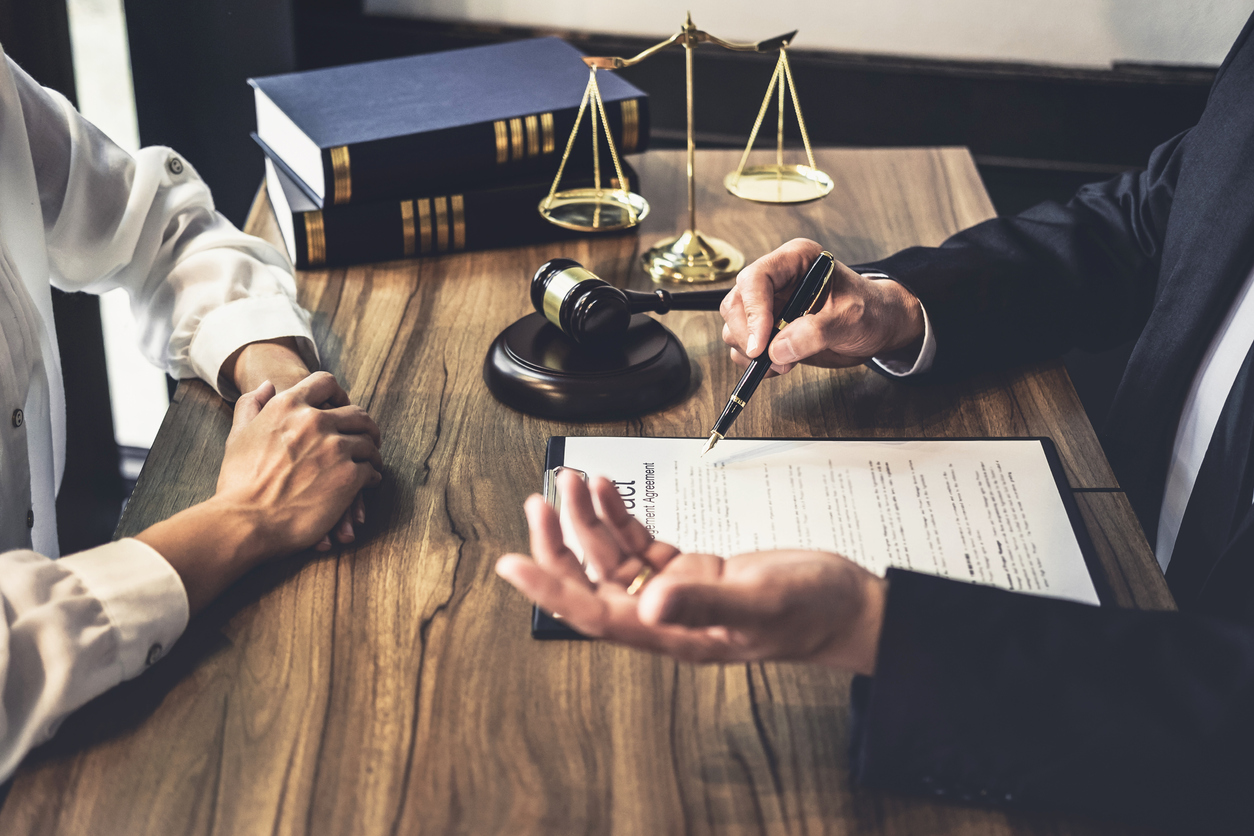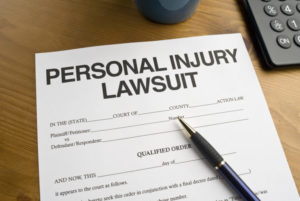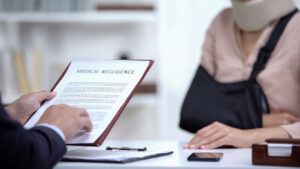John Austin | February 28, 2023 | Personal Injury

Personal injuries can happen in many ways, including slips and falls, car crashes, bike accidents, or truck accidents. Victims of personal accidents struggle with physical harm, emotional injuries, and financial strain.
You can pursue compensation if someone else’s negligence caused your injuries. However, insurance companies and defense attorneys may argue that you “assumed the risk” of getting hurt or that your actions contributed to the accident.
Therefore, you should work with a legal professional to protect your legal right to compensation. At Roman Austin, our personal injury attorneys understand these tactics and know how to fight back.
They can investigate your case, gather evidence, and use legal strategies to counter the assumption of risk arguments. We present a compelling case against unfair blame, so you can focus on healing while we fight for a fair and just settlement.
Assumption of Risk Key Takeaways
- Assumption of risk in law is a defense where defendants argue that you voluntarily accepted known dangers, limiting compensation.
- A personal injury lawyer counters unfair risk arguments, investigates negligence, and fights to protect your right to damages.
- The value of a personal injury lawsuit depends on injury severity, evidence strength, and available insurance coverage.
- Compensation can include medical costs, lost earnings, out-of-pocket expenses, pain and suffering, emotional distress, and loss of enjoyment of life.
- Call a personal injury attorney to protect yourself from unfair blame.
What Is Assumption of Risk in Law
Assumption of risk is a legal defense used in personal injury cases where defendants argue that the injured party voluntarily accepted known dangers associated with an activity. The legal doctrine can impact accident victims’ ability to recover compensation for their losses.

Types of Assumption of Risk
- Express assumption of risk occurs when someone explicitly agrees to accept risks through signed waivers, contracts, or verbal agreements. Common examples include liability waivers for recreational activities like skydiving, rock climbing, or gym memberships.
- The implied assumption of risk involves situations where a person’s conduct demonstrates they understood and voluntarily accepted inherent dangers. This includes riding in vehicles with reckless drivers, cycling in hazardous traffic conditions, or traveling in areas with known accident risks.
Application in Accident Cases
In personal injury lawsuits, defendants use the assumption of risk to argue they shouldn’t be liable because the victim knowingly participated in dangerous activities. However, the assumption of risk has some limitations.
It typically only applies to inherent risks that are apparent and unavoidable parts of the activity. The defense doesn’t protect against negligent conduct beyond normal activity risks. For example, while truck drivers assume the risk of typical roadway hazards, they don’t accept the risk of poorly maintained trucks or unsafe loading practices.
What Can a Personal Injury Lawyer Do for You
A personal injury attorney can prove the assumption of risk by demonstrating that the victim lacked knowledge of specific risks. They should also explain that the victim did not voluntarily choose to proceed despite understanding the dangers.
When negligent parties attempt to escape liability by claiming you assumed the risk of injury, a skilled personal injury lawyer becomes your strongest advocate. Courts commonly see assumption of risk defenses in car crashes, truck accidents, and dog bites, but these claims often lack merit.
An experienced personal injury attorney can dismantle these defenses and protect your right to compensation. Here’s how they prevent assumption of risk:
Distinguish Between Inherent and Negligent Risks
A personal injury lawyer can differentiate between risks that are naturally part of an activity versus dangers created by negligence. While you might assume certain inherent risks when participating in activities, you don’t assume risks caused by others’ careless conduct.
For example, a skier assumes the risk of falling on slopes but not the risk of poorly maintained equipment or unmarked hazards. A personal injury attorney can demonstrate that the defendant’s negligence created dangers beyond what you can reasonably expect to encounter.
Challenge the Validity of Waivers and Releases
Many assumptions of risk claims rely on signed liability waivers, but these documents aren’t automatically enforceable. A personal injury lawyer can scrutinize waiver language for ambiguity, overreach, or violations of public policy.
They examine whether waivers appear correctly and whether you had adequate time to read and understand the terms. They will also check whether the language covered the specific type of negligence that occurred.
A personal injury attorney can make a compelling case to a court that often refuses to enforce broad waivers or attempt to shield parties from gross negligence.
Prove Lack of Knowledge About Specific Risks
For the assumption of risk defenses to succeed, defendants must prove that the injured victim had actual knowledge of the specific danger that caused the accident. A personal injury attorney uses evidence to show you didn’t receive adequate warnings about specific hazards or that risks were hidden or misrepresented.
They can demonstrate, through witness testimony or expert analysis, that reasonable people in your position wouldn’t have understood or appreciated the dangers involved.
Establish Shared Liability
Even when some assumption of risk exists, a personal injury lawyer can argue for shared liability rather than claim dismissal. They work to show that while you may have assumed some risks, the defendant’s negligence contributed to your injuries.
The argument for shared liability allows for partial recovery based on fault percentages rather than case dismissal.
Demonstrate Gross Negligence or Reckless Conduct
A personal injury attorney can investigate whether defendants’ actions rose to the level of gross negligence or reckless conduct. When there is reckless conduct or gross negligence, the courts do not allow waiver through assumption of risk defenses.
For example, a personal injury lawyer can gather evidence of safety violations or deliberate disregard for known dangers.
How Much Can You Sue for Personal Injury
There is no average value you can use for a personal injury accident. The value of your claim depends on the facts and circumstances of the accident. Here are the factors that influence how much you can sue for a personal injury:
Severity of Injury
The extent and permanence of your injuries directly impact potential lawsuit value. Minor injuries like sprains or bruises typically result in smaller settlements covering economic losses. However, catastrophic injuries such as spinal cord damage or amputations can justify millions in compensation.
Severe injuries require extensive medical treatment, long-term rehabilitation, and often result in permanent disabilities. Injured victims deserve higher settlement values because of their inability to work and enjoy life.
A personal injury lawyer can present evidence to the courts of future medical expenses, lost earning capacity, and pain and suffering for severe injuries. For example, they can use evidence to prove multiple surgeries, ongoing therapy, or lifetime care.
Availability of Evidence
You must prove the actions of the negligent party to receive a fair personal injury settlement value for your losses. Strong evidence increases lawsuit value by proving liability and demonstrating injury severity.
A personal injury lawyer can strengthen your claim using medical records, diagnostic imaging, witness statements, and accident scene photographs. They can also use video footage from surveillance cameras or dashcams as compelling proof of negligence.
Conversely, weak or contradictory evidence reduces potential compensation as insurance companies and juries question the extent of injuries or fault.
Insurance Coverage of the Negligent Party
The negligent party’s insurance coverage is the source of compensation for the injured victim. Therefore, the defendant’s insurance policy limits often cap your potential recovery regardless of actual damages.
Minimum liability coverage varies by state but may be inadequate for severe injury cases. Defendants with higher coverage limits or multiple insurance policies provide better recovery opportunities.
A personal injury attorney pursues compensation beyond insurance limits. For example, they can explore umbrella policies, commercial coverage, or multiple liable parties to maximize your recovery.
Shared Fault
Shared liability laws reduce your potential recovery based on the percentage of fault in causing the accident. If a court assigns you 20 percent responsibility for the incident, your compensation decreases by that amount.
Insurance companies can use shared fault rules to shift blame and minimize financial liability. However, a personal injury lawyer can use evidence to protect you from being blamed for the crash.
Can I Get Compensation for Personal Injury
You can initiate a personal injury claim or lawsuit to receive compensation for your losses. Some of the damages you can receive include:

Medical Expenses
Personal injury claims cover all reasonable medical costs related to your injuries, including emergency room visits, hospital stays, surgeries, diagnostic tests, prescription medications, and rehabilitation therapy.
You can also pursue compensation for future medical expenses for ongoing care, follow-up surgeries, physical therapy, and specialized equipment like wheelchairs or prosthetics. A personal injury lawyer can use medical records to prove the severity of your injury and support your claim.
Lost Income and Earning Capacity
You can recover compensation for income lost during recovery periods. Lost income covers regular salary, hourly earnings, overtime, bonuses, and self-employment earnings. A personal injury attorney can document your losses using pay stubs, tax returns, and employer statements.
You may also recover for diminished future earning capacity if injuries prevent you from returning to your previous occupation. An economic professional can testify about lifetime earning losses for a permanently disabled victim.
Out-of-Pocket Expenses
Personal injury compensation covers various accident-related expenses, including:
- Transportation to medical appointments
- Prescription copays
- Medical equipment purchases
- Home modifications for accessibility
- Domestic help during recovery.
Out-of-pocket expenses accumulate over time, disrupting finances. A personal injury attorney can use bank statements, credit card statements, receipts, and medical records to push for compensation for these losses.
Pain and Suffering
Pain and suffering damages compensate an injured victim for pain, discomfort, trauma, and inconvenience resulting from the accident. A personal injury attorney can prove pain and suffering using medical records, professional testimony, and personal journals detailing daily struggles.
Emotional Anguish
Serious injuries often cause anxiety, depression, post-traumatic stress disorder, and other psychological trauma. A personal injury lawyer can use mental health treatment costs and testimony from psychiatrists or psychologists to establish emotional anguish damages.
Loss of Enjoyment of Life
You can receive compensation when injuries prevent participation in previously enjoyed activities like sports, hobbies, or social events. Loss of compensation addresses this diminished quality of life.
A personal injury attorney can demonstrate how the injuries have changed your lifestyle and recreational capabilities.
Loss of Consortium
These damages compensate spouses for loss of companionship, affection, and intimate relationships resulting from their partner’s injuries. Loss of consortium acknowledges that family relationships suffer when serious injuries alter family dynamics and shared activities.
Don’t Face Insurers Alone
You’ll likely endure financial strain after sustaining an injury in a personal accident caused by someone else’s negligence. For example, a limb fracture can keep you out of work for months, leading to lost earnings.

Therefore, you deserve compensation from a legal professional who’ll tirelessly protect your right to fair compensation. A personal injury lawyer can use different sources of evidence to face insurers or litigate the claim to maximize recovery.
Contact Roman Austin at (727) 787-2500 to schedule a free case evaluation.
Personal Injury Frequently Asked Questions
Why Is My Personal Injury Case Going to Trial
You take your personal injury case to trial when insurance companies refuse fair settlement offers, liability is unclear, or damages are substantial. Other reasons include disagreements over injury severity, medical necessity, or insurance bad faith practices.
A personal injury attorney can recommend a trial when negotiations fail and litigation offers the best chance for adequate compensation for your injuries and losses.
How Much Does a Personal Injury Lawyer Take
Personal injury lawyers typically work on contingency fees, meaning they only get paid if you win your case. Their fee is a percentage of your settlement or court award, not upfront payments.
The applicable percentage depends on case complexity, whether it goes to trial, and your agreement terms. The contingency fee arrangement allows injury victims to pursue justice without financial risk.
Is It Worth Hiring a Personal Injury Attorney
Hiring a personal injury attorney increases your chances of a favorable outcome in a claim or lawsuit. Studies show that represented clients receive higher settlements than those facing claims without professional help.
A personal injury lawyer understands insurance tactics, estimates the value of damages, negotiates, and isn’t intimidated by insurance companies. They can also handle legal procedures, meet deadlines, and fight for maximum compensation.


